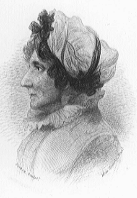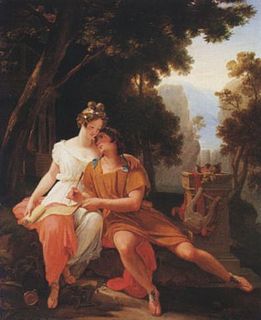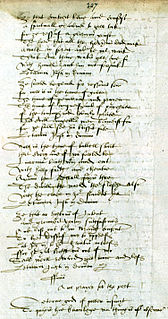Related Research Articles

Anna Laetitia Barbauld was a prominent English poet, essayist, literary critic, editor, and author of children's literature. A "woman of letters" who published in multiple genres, Barbauld had a successful writing career that spanned more than half a century.

Irish poetry is poetry written by poets from Ireland. It is mainly written in Irish and English, though some is in Scottish Gaelic and some in Hiberno-Latin. The complex interplay between the two main traditions, and between both of them and other poetries in English and Scottish Gaelic, has produced a body of work that is both rich in variety and difficult to categorise.

Sextus Propertius was a Latin elegiac poet of the Augustan age. He was born around 50–45 BC in Assisium and died shortly after 15 BC.

Katherine or Catherine Philips, also known as "The Matchless Orinda", was an Anglo-Welsh royalist poet, translator, and woman of letters. She achieved renown as a translator of Pierre Corneille's Pompée and Horace, and for her editions of poetry after her death. She was highly regarded by many notable later writers, including John Dryden and John Keats, as being influential.
Nationality words link to articles with information on the nation's poetry or literature.
Nationality words link to articles with information on the nation's poetry or literature.
Nationality words link to articles with information on the nation's poetry or literature.
Nationality words link to articles with information on the nation's poetry or literature.
Scottish Gaelic literature refers to literature composed in the Scottish Gaelic language and in the Gàidhealtachd communities where it is and has been spoken. Scottish Gaelic is a member of the Goidelic branch of Celtic languages, along with Irish and Manx.
Elizabeth Tollet was a British poet. Her surviving works are varied; she produced translations of classical themes, religious and philosophical poetry and poems arguing for women's involvement in education and intellectual pursuits such as natural philosophy. Unusually, for a woman of her time, her poetry also includes Newtonian imagery and ideas. Some of her poetry imitates the Latin verse of Horace, Ovid, and Virgil. In some of her poems, Tollet paraphrases the Psalms.

Mary Matilda Betham, known by family and friends as Matilda Betham, was an English diarist, poet, woman of letters, and miniature portrait painter. She exhibited at the Royal Academy of Arts from 1804 to 1816. Her first of four books of verses was published in 1797. For six years, she researched notable historical women around the world and published A Biographical Dictionary of the Celebrated Women of Every Age and Country in 1804.

That part of the United Kingdom called Northern Ireland was created in 1922, with the partition of the island of Ireland. The majority of the population of Northern Ireland wanted to remain within the United Kingdom. Most of these were the Protestant descendants of colonists from Great Britain.
Elizabeth Ogilvy Benger was an English biographer, novelist and poet. Some of her poetry had a strong social message.
Marion Emily Angus (1865–1946) was a Scottish poet who wrote in the Scots vernacular or Braid Scots, defined by some as a dialect of English and others as a closely related language. Her prose writings are mainly in standard English. She is seen as a forerunner of a Scottish renaissance in inter-war poetry – her verse marks a departure from the Lallans tradition of Robert Burns towards that of Hugh MacDiarmid, Violet Jacob and others.

Poetry of Scotland includes all forms of verse written in Brythonic, Latin, Scottish Gaelic, Scots, French, English and Esperanto and any language in which poetry has been written within the boundaries of modern Scotland, or by Scottish people.
Màiri nighean Alasdair Ruaidh (c.1615–c.1707), also known as Mary Macleod, was a Scottish Gaelic poet.
Anne Southwell [née Harris], later called Anne, Lady Southwell, was a poet. Her commonplace book includes a variety of works including political poems, sonnets, occasional verse, and letters to friends.

Sarah Leech was an Irish poet. She is the only known published female Irish weaver poet and one of the few women of the time to have poetry published in the Ulster Scots dialect.
Seán na Ráithíneach Ó Murchadha was a poet and scribe from Carrignavar, County Cork.
Anna Young Smith (1756–1780) was an American poet from Philadelphia. Her early poetic efforts were encouraged by her aunt, Elizabeth Graeme Fergusson, and she went on to circulate her writing within Philadelphia's literary coteries. Smith's notable works include Ode to Gratitude, On reading Swift's Works, and An Elegy to the Memory of American Volunteers. She died aged 23 and most of her poems were published posthumously.
References
- 1 2 3 4 5 6 Lunney, Linde (2009). "Elder, Olivia". In McGuire, James; Quinn, James (eds.). Dictionary of Irish Biography. Cambridge: Cambridge University Press.
- 1 2 3 Carpenter, Andrew (2017). "Olivia Elder: 'Poor, poetess and ancient maid'". History Ireland. 25 (4). Retrieved 3 March 2020.
- ↑ Carpenter, Andrew (1998). Verse in English from eighteenth-century Ireland. Cork: Cork University Press. pp. 343–346. ISBN 9781859181034.
- ↑ Ward, Melanie. "The Poems of Olivia Elder". Ireland's Own. Retrieved 3 March 2020.
- ↑ "1770 poem, Olivia Elder, 'An Elegy on J.S., J. G—ggs Clerk'". www.ulsterscotsacademy.com. Retrieved 3 March 2020.